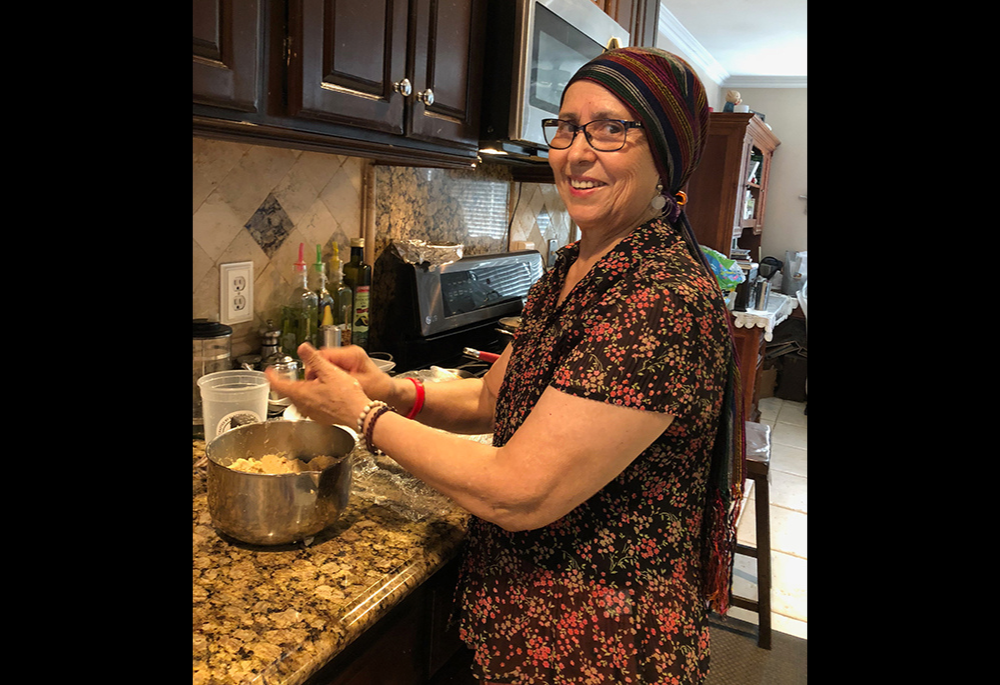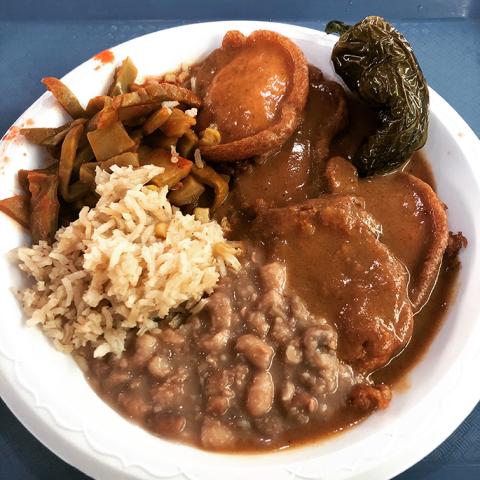
Maria de la Luz Arellano Miranda, Gustavo Arellano's mother, cooks gorditas for her family in 2018. She passed away a week after Easter four years ago from ovarian cancer at 69. (Courtesy of the Arellano family)
Almost every Thursday this Lent, I've received the same call from my father.
"¡Mexicano! Tu tía cocinó para cuaresma, y te va mandar comida."
("Mexican! Your aunt made food for Lent, and she's going to send you some.")
He'll say this usually on Thursdays, always after visiting his siblings, who live across the suburbs of Los Angeles. My Tía Nacha. Tía Mela. Tía Paulita. Tía Chayo. My Uncle Gabriel, whose wife, Elvira, also joins in the cooking. The following day, I'll go pick up my bounty at my dad's home in Anaheim, or he'll drop it off at my house.
I stuff myself for the rest of the week — and then I have a fresh batch again. All I have to do is return everyone's Tupperware.
My aunts are incredible chefs who cook wonderful meals at the many family get-togethers they host year-round. But come Lent, they and millions of other Mexican moms work especially diligently to prepare a rotating cast of Mexican meat-free lunches and dinners that make fish fries seem as tasty as salted cardboard.

Tortitas de camarón, puffy fritters made from powdered shrimp and served in a thick red stew studded with sautéed cactus (Courtesy of Gustavo Arellano)
Cheese enchiladas colored a deep red thanks to the spicy, smoky chile de árbol family members bring any time one of us visits their native state of Zacatecas in central Mexico. Pinto beans and Spanish rice, of course. Fluffy chile rellenos stuffed with sharp, stinky Zacatecan cheese. Tortitas de camarón — puffy fritters made from powdered shrimp and served in a thick red stew studded with sautéed cactus. Sometimes, my dad will even bring a bowl of huachales, a soup of dried corn kernels that's as hearty as it sounds.
They're not the most Instagrammable of feasts, but none are more beautiful.
No matter what any of my aunts whip up, they always send along a slice of capirotada, the quintessential, Mexican Lenten dessert. It's a type of bread pudding that varies wildly by household — Elvira puts in stewed carrots, my Tía Nacha goes heavy on the nonpareils, and I have friends whose mothers throw in fruits like apricots and apples and think the zacatecano tradition of adding cheese is weird. But no matter the preparation, capirotada is especially beloved because it's the one dish that families make only during Lent — because it represents the Crucifixion.
Bread stands for the body of Christ. The syrup you carefully pour over each layer of bread is his blood. The cinnamon sticks, used to boil down the syrup, then tossed into the capirotada to imbue it with just a little bit more sweetness while everything bakes, is the crucifix. And the cloves used to impart a bite to the syrup but taken out before everything goes into the oven function as the literal nails: Clavos means cloves and nails in Spanish.
I wish I could tell you that everyone who eats capirotada reflects on this symbolism every time we eat it. But reflection quickly turns into gluttony, making the weeks leading up to Good Friday seem as if Mardi Gras never ended.

Capirotada, the quintessential, Mexican Lenten dessert (Courtesy of Gustavo Arellano)
The parade of meals my aunts have sent me every week this spring also led to a necessary reminder about the true meaning of Lent. Because there's one family cook who is missing: my mami.
Maria de la Luz Arellano Miranda passed away a week after Easter four years ago from ovarian cancer at 69. I will forever associate Lent with her love.
Every Friday during Lent without fail while she was healthy, Mami prepared the season's specialties. She made all the foods my aunts make, but also others. Freshly fried potato tacos with shredded lettuce, sour cream and a light red salsa. Green chicken enchiladas. Arroz de leche — rice pudding. A wonderful potato soup tinted orange with tomatoes and cumin. Bean gorditas, which my mom patted out with her strong arms bulked up by decades of working in a tomato factory.

Enchiladas are pictured. The parade of meals Gustavo Arellano's aunts have sent him every week this spring have led to a necessary reminder about the true meaning of Lent. (Courtesy of Gustavo Arellano)
She cooked them when I was younger and then older. When she was working full-time, or unemployed. When she was weathering the neglect of my father, or helping to raise my nephew. Nothing would stop her from feeding her four children.
When I was a teen, I'd circle the kitchen every Friday as she cooked, lured by sizzles and smells. As an adult, I'd stop by from work to sneak in a bite whenever she wasn't looking, and plead ignorance when she'd scold me with a smile.
I'll obviously never eat her cooking ever again — and that gnaws at me every Lent. I never asked her to teach me any of her recipes besides her capirotada, which I asked for only weeks before she died and which she had to dictate to my cousins and me from her bed.
My mother was a far better Catholic than I. She and my sister recited the rosary every night through her cancer battle, while I stopped attending Mass long ago, fed up with the church after covering its sex abuse scandals since the mid-2000s. But I've never stopped believing in the Gospel, so I found comfort recently in the retelling of Lazarus' resurrection on the Fifth Sunday of Lent.
In it, Jesus tells Mary and Martha that his friend's illness "is not to end in death, but is for the glory of God, that the Son of God may be glorified through it." Set aside what you see right now, Jesus is telling the sisters, and pay attention to what I'm going to do.
Advertisement
That was my mother every Lent. She sacrificed her time so my siblings and I could be happy. And she knew that she would live forever not only in our hearts, but in our stomachs every time we'd eat capirotada and other Lenten meals. And it was those meals that would dry our tears and make us recall everything wonderful that she did for us.
I'm technically getting the leftovers that my tías cooked for their own children, grandchildren and great-grandchildren, but I know they don't see it that way. I always enjoyed their food growing up, and my parents sometimes brought me family leftovers. But this year — the first since the COVID-19 pandemic put a damper on family gatherings — is the first they have regularly sent me Lenten fare.
They've never told my father or me explicitly that they're trying to comfort our continued, eternal grief over the loss of my mami. Then again, mis tías don’t have to. I taste their care with every spoonful and forkful, hear their warm voices every time the microwave beeps to announce my lunch is ready. It's the fuel I need to remember my mom, appreciate what I now have — and know it can disappear at any time.
I know this new tradition will not last forever. My aunts are in their 70s, and while they come from good genes — my abuelita turned 100 last summer and is as spunky as ever — they know their eternal reward isn't far away. That's why next year, I want to spend time with each of them and learn how to cook their dishes.
I made the mistake of not doing that with my Mami — I can't afford to do it again.
And isn't that what Lent is about? It's the time to recall that Christ died for our sins, and remember that it's never too late to change our ways. If it took reheated enchiladas to make me realize that, well, better late than never.








